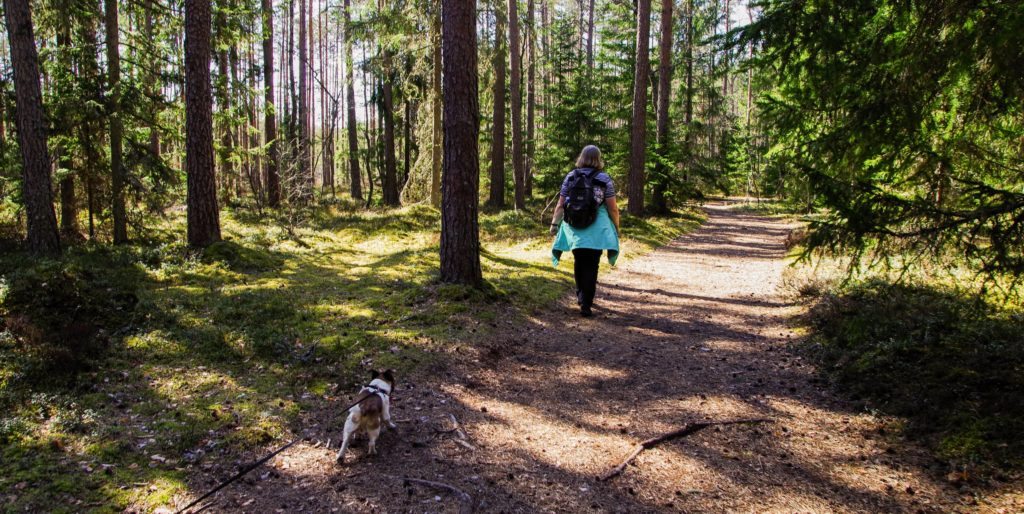Forest Bathing, or Shinrin-Yoku, is the Japanese practice of performing quiet reflection in nature for as little as ten minutes or as long as a few hours. The term is made up of three characters (森林浴), the first means forest, the second represents connection within the forest, and the third means to enjoy the abundance of life. Historically, forest bathing emerged as an aspect of Shintoism, a religion in which gods resided in all aspects of nature. Because of this, forests are sacred places in which every rock, plant, and animal has spiritual meaning. This is what makes up the basis for Shinrin-Yoku, but there is scientific research to support this practice as well.
Short-term Benefits
Shinrin-Yoku has been an accepted healthcare prescription in Japan since the 1980s, though it has only reached Western society in the last two decades. Still, hundreds of studies have been conducted to explore the immediate effects of forest bathing on mental health and academic performance. In general, a study may require its test subjects to go for a walk in either a forest or in a metropolitan area, then have them perform an academic test or complete a survey on their emotional state.
Also, saliva samples are often taken from test subjects before and after Forest Bathing in order to test their cortisol levels. Cortisol is known as a ‘stress hormone’, produced in our bodies that increases when we experience stress. Testing the subjects’ cortisol levels helps the study to effectively measure stress and relaxation in response to stimuli. Meta-analyses have been performed based on these studies, and they cumulatively indicate that forest bathing has a positive impact on mental health and academic performance. However, because Forest Bathing was only recently accepted in medicine, there are still a lot of unknowns as regards its impact and long-term effects on physical health.
Long-term Benefits
Until more multi-year studies can be completed, the best way to understand the physical and long-term impacts of Forest Bathing is to examine the factors that could lead to such impacts. Much of the psychological benefits of Forest Bathing come from the visual and tactile experience of being in nature, but our sense of smell, in particular, makes this practice beneficial to our body. Many studies have been done on these effects, which have been condensed and compared in later analyses. These meta-data studies show that forest bathing benefits the immune system, cardiovascular system, and respiratory system; all in addition to contributing to psychological health. Forest Bathing is not meant to be an exercise, yet it strengthens the body.

So, how does it work? There are two compounds produced by trees that may be able to explain it. Pinene and Limonene are volatile organic compounds or chemicals produced by trees and vaporize in the air. Any given tree species may produce upwards of 200 different volatile compounds. This means that there are far more compounds involved in the benefits of forest bathing than only these two. However, these two are currently the most understood. Trees produce these chemicals to communicate with each other and their environment. For example, limonene is known to deter insect feeding, however, when it is released into the air, it also acts as a warning signal to other trees that an herbivore is nearby. It may also lead to the attraction of a predator of the insect.
The human body is also capable of responding to plant volatile signals through our sense of smell. Findings have shown that exposure to these volatile compounds helps to improve the conditions of people with inflammatory illnesses such as dermatitis and arthritis. It is also thought to be applicable as preventative medicine for cancer. Exposure to plant volatiles through forest bathing causes the body to produce more of the immune cells required for cancer prevention.
Don’t Take Our Word For It, Give It a Try!
Forest Bathing is an experience meant to engage all of the senses in order to facilitate healing. Understanding the individual components is important, but studies indicate that experiencing only one aspect of the sensory stimulation, such as the sight of trees or the smell of volatiles, will not produce the same results as walking in a forest would. Research on individual components of Forest Bathing is still important, but the beauty of this experience is that it cannot be bottled and sold. Interestingly, you don’t even need a forest to get the full experience. This nature’s therapeutic medicine is available to you at your local park or wherever you can find trees.
For more information on how Ontario Parks supports the practice of Forest Bathing, visit their blog for directions on how to try it at your local nature preserve.
Enjoyed this article? Visit the 4P Academy Blog for more informative pieces on a variety of fascinating topics.

